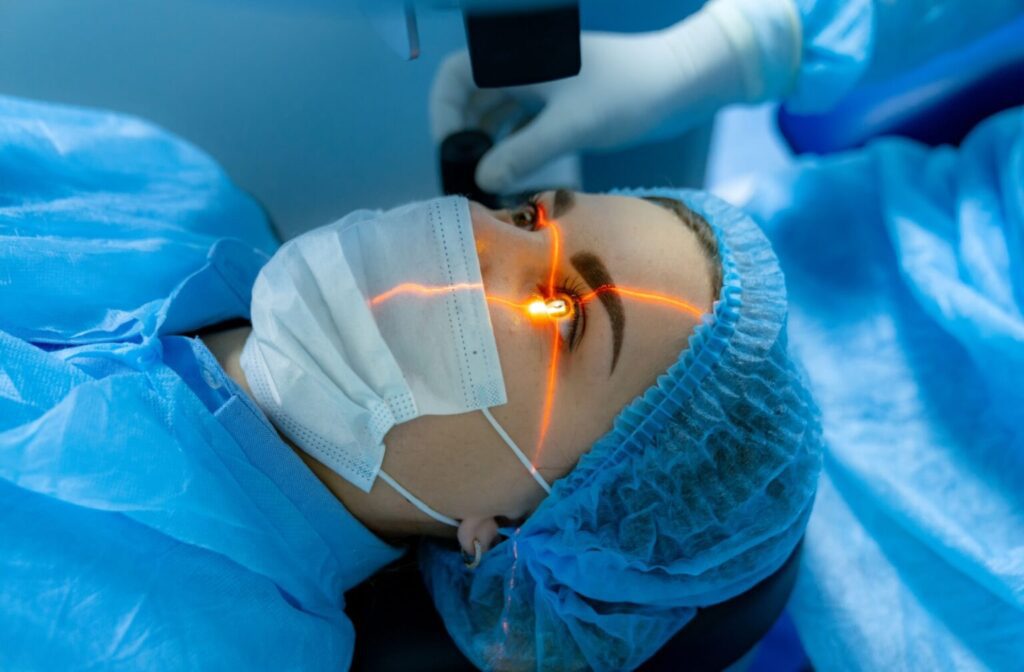Table of Contents

Introduction
If you’re looking for a permanent solution to myopia, you’ve probably thought about laser eye surgery. It’s an excellent way to find a permanent answer to plenty of different vision problems. However, there’s a catch—there’s more than one type of laser eye surgery.
There are 2 main types of laser eye surgery:
- LASIK, a precise laser-assisted approach for most general refractive errors
- PRK, which is ideal for thinner corneas or unusual curvatures of the eye
To determine which approach is right for you, you’ll need to book a laser eye surgery consultation with your optometrist.
What Is Laser Eye Surgery?
Laser eye surgery is a precise medical procedure designed to alter how light enters the eye. It’s ideal for conditions like myopia, where the eye grows to be too long, or hyperopia, where the eye grows too wide.
Surgeries like LASIK and PRK aim to change the shape of the cornea itself, which adjusts the angle at which light reaches the retina. When performed correctly by an experienced professional, laser eye surgery offers a permanent solution to:
- Myopia (nearsightedness)
- Hyperopia (farsightedness)
- Astigmatism (the unusual curve of the cornea)
- Presbyopia (an age-related refractive error)
By reshaping the cornea, laser eye surgery corrects these refractive errors, allowing light to focus properly inside the eye. This results in clearer vision without the need for glasses or contact lenses.
What Is LASIK?
LASIK (laser-assisted in situ keratomileusis) is one of the most well-known types of laser eye surgery. This is a precise and effective approach that uses high-tech lasers to alter the shape of LASIK has several key steps:
- Numbing eye drops are applied to keep you comfortable throughout the procedure.
- A flap is created on the cornea’s surface using a precise laser
- The corneal flap is lifted to expose the underlying corneal tissue
- An excimer laser precisely reshapes the corneal tissue to give you clear vision
After the reshaping, the flap is repositioned, acting as a natural bandage. There’s no need for stitches; the tissue will naturally adhere to the cornea and heal over a short period. During the surgery, you may experience some pressure inside the eyes, but the eye drops should prevent significant discomfort.
With LASIK, you can expect a quick recovery time. Most patients experience improved vision within 24-48 hours or so, making LASIK a popular, effective, and convenient way to gain permanent clear vision.
Who Qualifies for LASIK?
To qualify for LASIK, you need to visit your optometrist for a laser eye surgery consultation. LASIK requires your cornea to be thick enough to withstand the reshaping, so it isn’t an ideal solution for everybody. To qualify for LASIK, you should:
- Be at least 18 years old
- Have a stable prescription for at least one year
- Not be experiencing any eye conditions like cataracts, dry eye, or glaucoma
- Not be pregnant or nursing
During your consultation, your optometrist will verify that LASIK is safe for your unique situation. They’ll also examine your cornea and map out the changes you’ll need for clear vision. Then, they’ll refer you to a surgeon in your area.

What Is PRK?
PRK (photorefractive keratectomy) is another type of laser eye surgery. It predates LASIK and doesn’t involve creating a corneal flap. Instead, PRK entirely removes the epithelium—the outer layer of the cornea—to reshape the underlying tissue.
Similar to LASIK, you’ll need to visit your optometrist before planning for the surgery. They’ll need to examine your eyes to determine if PRK is safe for you. If so, you can expect the following:
-
- Numbing eye drops will be applied to keep you comfortable throughout the surgery.
-
- Using a precise laser, your surgeon will remove the outer layer of your cornea.
-
- Using a second laser, your surgeon will reshape the underlying corneal tissue.
PRK has a slightly longer recovery time compared to LASIK. The corneal needs time to re-grow the outer layer, so your surgeon will install a contact-lens-style bandage to protect your eye while it heals. It may take a few days to start seeing results from PRK, and it can take some time before your eyes fully heal.
While the recovery time is longer, PRK is still an extremely effective option for those seeking long-lasting clear vision. It’s an excellent choice for those who don’t qualify for LASIK.
Who Should Get PRK?
PRK is ideal for those with:
-
- Thinner corneas
-
- A higher risk of corneal flap complications
-
- Unusual corneal structures
-
- An active or potentially high-impact lifestyle
This makes PRK a convenient solution if you’re looking for long-lasting clarity.
Is Laser Eye Surgery Right for You?
Both LASIK and PRK can be excellent answers to refractive errors. If you’re looking for a solution to your vision problems, come see our team at Golden Vision Optometry for a laser eye surgery consultation. Our team can guide you through the process to help you find the answer you deserve, so book an appointment with us today.








